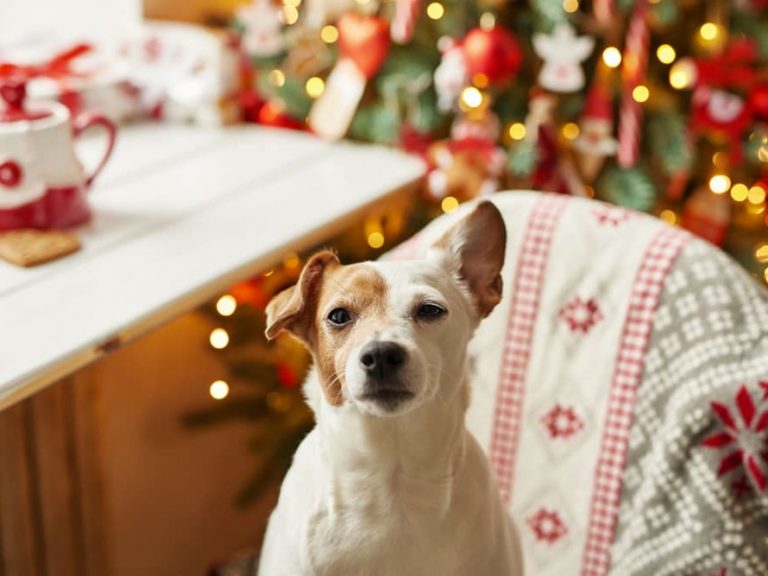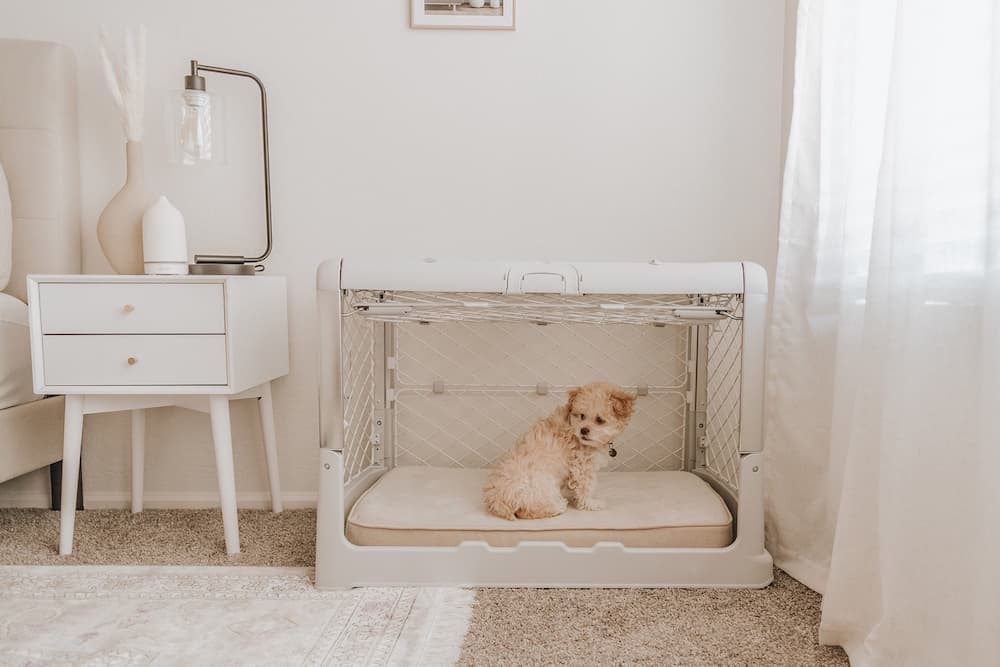Holiday Tips: How to Help a Stressed Dog During the Holidays

The holidays are hectic enough, who wants to add a dose of dog training into the mix? While this may truly be the last thing you want to add to your list, dogs who are fearful of strangers or especially sensitive to change can often use some extra-special help during the holiday season. Without it, your typically well-mannered dog might get stressed to the max, potentially creating a dangerous situation for you, your guests and themselves.
Keep reading for tips on how to help a stressed dog handle the holiday havoc.
What Causes Stress in Dogs Around The Holidays?
Holidays can be as (or even more!) stressful for your pup as they are for you. Just as humans can become short-tempered with holiday overload, imagine being a dog limited to expressing feelings only with body language and the sound of their whine, bark, or growl—and no words to ask “Who are you?” or “What is this?”
Your pup is used to the house being a certain way, and if it suddenly flips for a month or two—new sights, new sounds, new smells, new people running around—this can put them on edge. Add to this a dog who’s protective of your home or family, or afraid of new people, and any aggressive tendencies may be more likely to surface.
Aggressive behavior can be triggered by the holidays because of:
- Drastic changes to the environment with decorations
- Strangers entering the house
- Loud noises coming from a party or music
- Chaos setting up, during, and after a party
- Broken normal routines due to holiday hustle and bustle
Many of these things cause stress in us humans, so it only seems natural our beloved dogs are feeling it too. Growling or barking at strangers is a common way dogs tell people to “back off,” but is not the only way. Snapping and biting can follow with even the most mild-mannered pups.
Management and support to help your dog feel safe are important. If left unchecked, there can be terrible consequences for you, your dog and your guests. If your dog shows signs of aggression toward strangers, consult a professional dog trainer before you do other party planning to ensure you have a strategy in place to keep everyone happy and safe.
Can Holiday Stress Lead to Aggression in Dogs?

There’s definitely a difference between “my dog gets overly excited when guests come over” and “my dog is aggressive toward guests.” Dogs who were not properly socialized from an early age are more likely to be timid or territorial when meeting new people or pets. Other common stress triggers in dogs who were not adequately exposed to new sights, situations and strangers include unfamiliar scents and loud noises.
If your dog is on edge this holiday season (or ever, really), it’s time to have a conversation with your veterinarian about how to manage your dog’s stress. Certified dog trainers typically ask that you have your dog examined to make sure there isn’t anything physical or medical contributing to the aggression.
In addition to examining your dog for signs of pain or illness, your pet’s veterinarian may also evaluate whether your pup could benefit from an anti-anxiety medication to ease their agitation and minimize aggression.
If your dog is generally calm but gets triggered by specific events, such as parties or fireworks, your vet might recommend trazodone hydrochloride. This calming medication takes effect quickly, so it’s ideal for short-term anxiety relief.

If your dog is high-strung or stressed out most days—and even more so during parties—your vet may prescribe a once-a-day anti-anxiety medication, such as Reconcile (fluoxetine hydrochloride) or an antidepressant, like Clomicalm (clomipramine).


However, medication is often only part of the solution for anxiety. After your vet has examined and treated or cleared your pup, it’s still a good idea to work with a trainer. They can help you understand the mental side of things—what types of situations (such as the holidays!) trigger fear and/or anxiety in your dog?
Your dog behavior consultant will probably work with you on a mix of training and behavior management techniques to help your dog feel safe, but we have a few tips of our own as well.
How to Help a Stressed Dog During the Holidays
No matter how much you prepare and take care of your dog (and yourself!) throughout the holidays, they will probably not be entirely stress-free. But you can still find ways for everyone to stress less. Here are a few quick wins to add to your pup’s column:
Prep before the party
The unusual activity that happens when a party is being set up can create anxiety for your dog. (Think tent rental companies with employees going back and forth, for example.) Keep your dog in a safe location away from all the activity where they can just chill and play with a toy or seven.
Give your dog their own “paw-ty” room
Imagine how amazing it would feel to walk into a room filled with all your favorite foods, drinks, smells, cozy blankets, and shows to binge watch. Try something like that for your dog. Set up a quiet, private room or space for your dog to enjoy their bed, toys, treats, and water in their comfort zone. You can even play calming music, use a pheromone diffuser or calming spray, or gently wrap your pup in a calming ThunderShirt to soothe them until the party is over.



Don’t forget about decoration safety
Tinsel, glass ornaments, and extra electric cords can all pose danger to your pet. Likewise, an anxious dog may find other items to chew or destroy when they’re scared. Make sure your dog has appropriate toys and comfy places to sleep, and limit the availability of other items.
Keep up your dog’s routine
It’s too easy to skip a walk or puppy playdate when a billion other things are fighting for your attention. Keeping consistency for your pet with things like mealtime and bedtime, even when the environment is completely flipped, can go a long way.
How to Help a Stressed Dog: Questions to Ask the Pros
This is not a time to “wait and see” or “tough it out.” The sooner you ask a professional for help with your pup’s stress or anxieties, the more likely you are to have fun, relaxing holiday. To help you get ahead of the issue, we’ve prepared a list of questions you can ask your veterinarian:
- What medical conditions may cause aggression? Can we rule them out?
- What do you recommend I do if my dog becomes agitated?
- What’s the difference between training and behavior modification?
- Are there medications or supplements we should try?
- Are there any brain-teasers I can use to tire my pup out?



